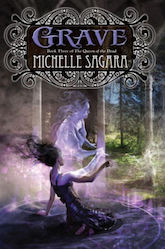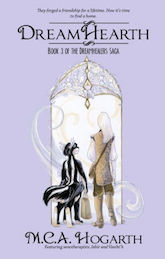I missed Michelle Sagara’s Grave when it came out in January 2017, though I’d been looking forward to the conclusion of the trilogy that started with Silence and continued in Touch. Emma Hall, whose necromantic power has drawn unpleasant attention from the Queen of the Dead, is on the run with her friends. If she’s going to survive and keep her friends alive—and open the doorway that leads the dead to peace, the one that the Queen has kept shut for centuries—she’s going to have to figure out how to confront the Queen and win.
Buy the Book


And how to let go of Nathan, the boy she loved, who is now dead and bound to the Queen’s service.
Sagara’s trilogy is about grief and loss, about learning to not let oneself be defined by pain. It’s about friendship and mourning, and love. Grave takes these themes and sharpens them to a knifepoint, without ever losing the essential kindness that has characterised the trilogy to date. The Queen of the Dead is, in the end, understandable in her cruelty: it is a cruelty that comes from pain and human flaws, not from petty evilness. Emma, confronting her, must confront her own grief and pain.
Grave is an excellent conclusion to a striking trilogy. I recommend it.
I also recommend the latest instalment in M.C.A. Hogarth’s Dreamhealers series, Dreamhearth. The Dreamhealers series is a very gentle sort of science fiction, starring the xenotherapists Jahir and Vasiht’h, two people from very different cultures and backgrounds whose unique mental abilities bring them into a partnership that’s both personal and professional—in many ways, it’s asexual romance. In Dreamhearth, Jahir and Vasiht’h are finally finished with their university education, and are trying to set up a practice—and a life—together. But their mutual felicity is complicated by Jahir’s money, Vasiht’h’s insecurities, and a local therapist who’s convinced that Jahir and Vasiht’h’s therapeutic modality is dangerous at best and deliberately, manipulatively harmful at worse.
Buy the Book


This is a quiet, patient, hopeful sort of story: a story about domesticity and talking through the things that trouble you with family; a story about making connections, helping people be more comfortable with themselves, and keeping those connections; a story about the kind of work that goes into making and building a strong, lasting relationship with another person. A story about not letting your insecurities sabotage your happiness. It’s truly lovely, and I really enjoyed it.
It’s good to have that kind of quiet story. A lot of science fiction—a lot of fantasy—is dedicated to questions of great political import: who lives, who dies, who rules, whose rules a person should live by. A story about small moments, about personal interventions, that make individual lives better and change the world only in very small ways is closer to the way we live our lives. It reminds me, at least, that small changes are worthwhile, and that doing the work of confronting your own insecurities is important. It’s a supportive sort of book. Compassionate domesticity is valuable too.
What are you guys reading lately?
Liz Bourke is a cranky queer person who reads books. She holds a Ph.D in Classics from Trinity College, Dublin. Her first book, Sleeping With Monsters, a collection of reviews and criticism, is out now from Aqueduct Press. Find her at her blog, where she’s been known to talk about even more books thanks to her Patreon supporters. Or find her at her Twitter. She supports the work of the Irish Refugee Council and the Abortion Rights Campaign.










